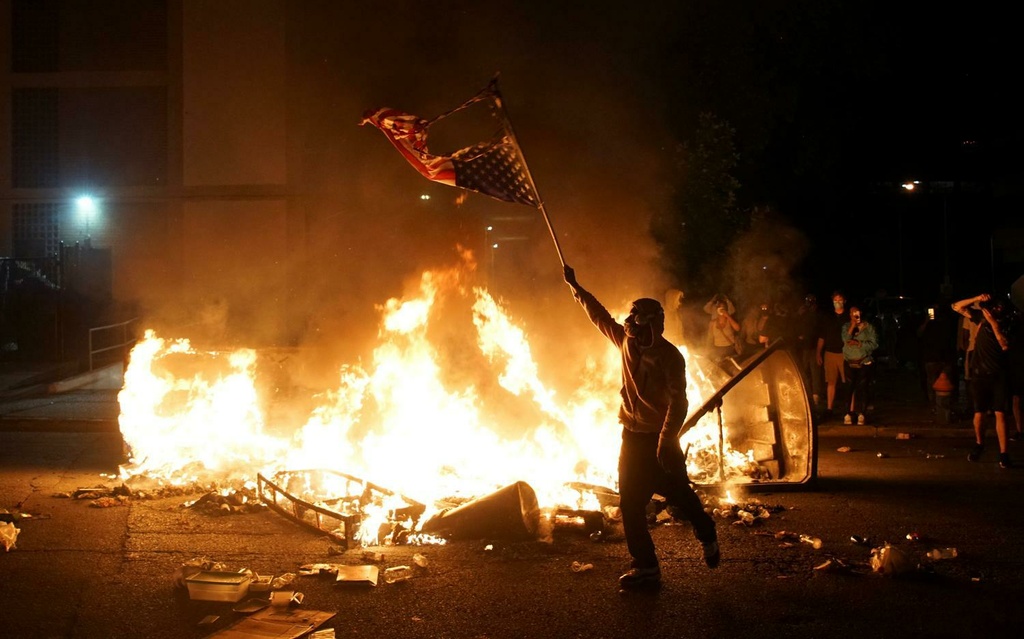
The New Barbarians
The new barbarians see themselves as victims, victims of racism, sexism, capitalism, and so on and on. Their mentality is one of entitlement. They assume that they should be heirs to their imagined goals because they want them.

- R. J. Rushdoony
A barbarian can be defined as a man who has no history because he rejects history. The new barbarians are self-consciously so. They are products of the existentialism of Kierkegaard, Nietzsche, Sartre, and others. An existentialist lives in and for the moment only, without reference to the past, to family, religion, education, or consequences. He is a self-willed barbarian in that his is by choice, unlike the barbarians of centuries ago.
Everywhere now statist education is the mass producer of barbarians, people who are ignorant of their past, who live rootless lives, and who feed their irresponsible goals with liquor and drugs. They live for the moment and its sensations.
The new barbarians do have their mythology. They believe that once happy natives populated the islands and continents, living happily guilt-free lives of sexual “freedom” until “corrupted” by Christianity. This myth has been repeatedly exploded, but it will not die because our new barbarians see it as their holy myth.
But when people deny their past, or cut their roots, they also deny their future, because life is a development, not a choice. We have today the insanity of people who insist that an evil establishment makes it impossible for them to realize their ambitions when the truth is that they lack the application and endurance to achieve anything.
The new barbarians see themselves as victims, victims of racism, sexism, capitalism, and so on and on. Their mentality is one of entitlement. They assume that they should be heirs to their imagined goals because they want them.
One of the marks of ancient paganism, whether in ancient Viet Nam or Greece, was the belief that not causality but an evil fate governs the world. The Greek tragedies are examples of such thinking. For the “hero,” the deck is always stacked against him. However innocent they are, the gods conspire to subject him to every kind of evil and to punish him relentlessly. Whether the Greek tragedies, or the Viet Nam Tale of Thiess, we see in these documents an unrelenting destruction of the good man. Not causality but perversity marks life and events.
As we look at popular television and film fare today, we see too much of this same mindless perversity, causeless evil, and general meaninglessness. This is important for the new barbarians as well as the old. Why be good when life is evil? Why strive to be virtuous when life and whatever gods may be are radically perverse?
We see in the new barbarians the same basic belief in the ultimacy of perversity as was the case with the old. The Venerable Bede reported that an important aspect of the conversion of England to Christianity was the contrast between the bleakness of their paganism and the remarkable light of Christianity.
What is startling about the new barbarians is their preference for evil and darkness. They want to be terrified even in their entertainment! The love of evil has become a fascinating and enticing thing to many. This should not surprise us. It is closely related to the love of death. As Proverbs 8:36 tells us, “But he that sinneth against me wrongeth his own soul: all they that hate me love death.” The love of death strongly marks the new barbarians. They are suicidal, and their future is a bleak one.
Christians who stand unequivocally in terms of Jesus Christ as Lord and Savior, and God’s law as the way of sanctification, are the future of the world. They are the people of life, not death (Jn. 14:6).
The new barbarians flirt constantly with death. Their “life style” can better be called a death style. “Can a man take fire in his bosom, and his clothes not be burned?” (Prov. 6:27). The world around us is suicidal. We have a duty to build for life. We were not converted by the Lord to sit back then and wait for heaven but to conquer a world for Him. Judgment awaits those who called and will not serve.

- R. J. Rushdoony
Rev. R.J. Rushdoony (1916–2001), was a leading theologian, church/state expert, and author of numerous works on the application of Biblical law to society. He started the Chalcedon Foundation in 1965. His Institutes of Biblical Law (1973) began the contemporary theonomy movement which posits the validity of Biblical law as God’s standard of obedience for all. He therefore saw God’s law as the basis of the modern Christian response to the cultural decline, one he attributed to the church’s false view of God’s law being opposed to His grace. This broad Christian response he described as “Christian Reconstruction.” He is credited with igniting the modern Christian school and homeschooling movements in the mid to late 20th century. He also traveled extensively lecturing and serving as an expert witness in numerous court cases regarding religious liberty. Many ministry and educational efforts that continue today, took their philosophical and Biblical roots from his lectures and books.